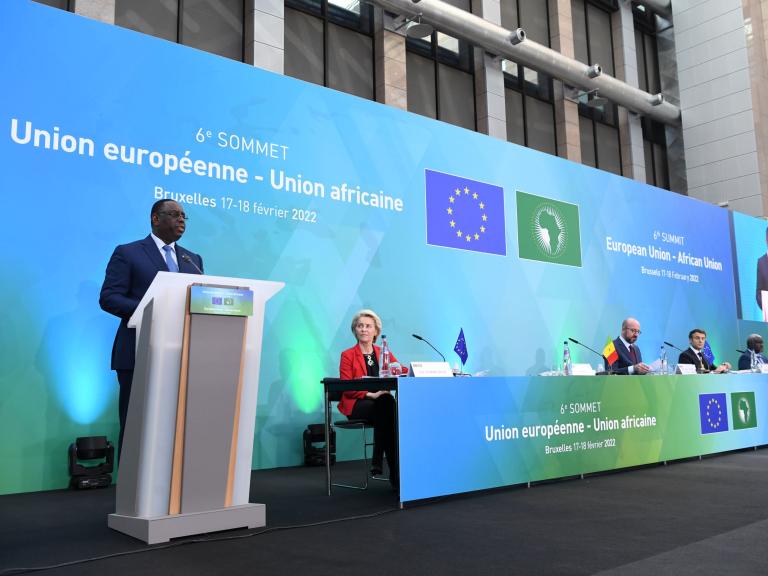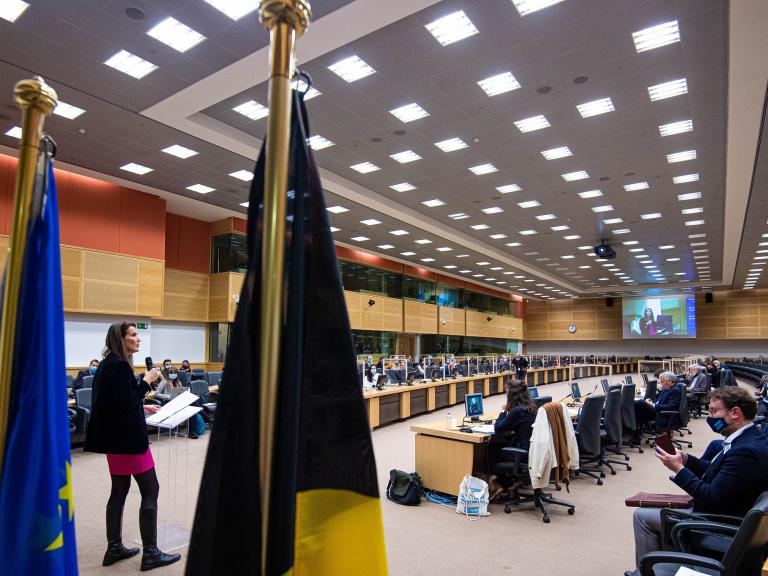-
Last updated on

© Shutterstock
Summary
Since 1992, economic governance has been a key pillar of the architecture of the EU’s Economic & Monetary Union (EMU). It aims to detect and correct macroeconomic imbalances that could weaken national economies and affect other EU countries through cross-border spillovers.
The EU economy is facing renewed challenges related to the recovery from the COVID-19 pandemic and the consequences of Russia's war of aggression in Ukraine. Against the backdrop of high debt levels and interest rates and new common investment and reform goals, the EU is revising the Stability & Growth Pact and re-examining how the pact's effectiveness could be further improved.
At the same time, the European Union is working to strengthen social convergence between Member States through the European Pillar of Social Rights, adopted in 2017.
Through this dynamic, the EU's objective is to ensure healthy and fair competition between Member States in terms of working conditions, while strengthening workers' rights and protection. The EU also intends to improve social well-being and access to social rights for European citizens, while respecting the competences of Member States in this area.
The Directorate General Coordination and European Affairs (DGE) coordinates the stances that Belgium defends in the areas of the EMU, the EU’s budget and social convergence in the EU’s fora.
Objectives for Belgium
Economic governance
The Economic & Monetary Union (EMU) is the concrete translation of economic integration in the European Union. It is designed to support sustainable economic growth and a high level of employment through appropriate economic and monetary policymaking. This comprises three main fields: 1) implementing a monetary policy that pursues the main objective of price stability; 2) avoiding possible negative spillover effects due to unsustainable government finance, preventing the emergence of macroeconomic imbalances within Member States and allowing Member States to coordinate their economic policies among themselves to a certain degree; 3) ensuring smooth operation of the internal market.
Created in 1999 and already part of daily life in 20 Member States of the European Union, the euro is a major pillar of this EMU. The single currency has a number of advantages which include lowering the costs of financial transactions, making travel easier and strengthening the role of Europe at international level. The euro helps complete the internal market.
Since 1992, economic governance has been another key pillar of the architecture of the Economic & Monetary Union. It aims to detect and correct macroeconomic imbalances that could weaken national economies and affect other EU countries through cross-border spillovers.
Since the Maastricht Treaty of 1992, this framework has gradually become more complex. Reforms have been implemented in response to economic crises such as the 2008 global financial crisis, which illustrated the interdependence of the European economies and demonstrated the vital need to strengthen socio-economic and financial governance within the EU and especially in the eurozone. Budgetary control has been strengthened and, due to the risk posed by the persistence of major imbalances in social and employment terms, indicators relating to these terms are now taken into account in economic analyses.
In particular, this framework is currently based on:
- the Treaty on the Functioning of the European Union: this sets thresholds that require government deficits to remain below 3% of gross domestic product (GDP) and public debt levels below 60% of GDP.
- the Stability & Growth Pact: a set of rules and procedures to strengthen the coordination of national fiscal and economic policies in the EU, adopted in 1997.
- the European Semester: an annual cycle of economic, fiscal, employment and social policy coordination within the EU, introduced in 2011.
- the "six-pack" and "two-pack" legislative reforms: additional rules and procedures to strengthen the Stability & Growth Pact, adopted in 2011 and 2013.
The EU economy is facing renewed challenges related to the recovery from the COVID-19 pandemic and the consequences of Russia's war of aggression in Ukraine. Against the backdrop of high debt levels and interest rates and new common investment and reform goals, the EU is revising the Stability & Growth Pact and re-examining how the pact's effectiveness could be further improved.
On 26/04/2023, the Commission presented a package of three legislative proposals to this end: two regulations aiming to replace (preventive arm) or amend (corrective arm) the two pillars of the Stability & Growth Pact first adopted in 1997, and an amended directive on requirements for budgetary frameworks of Member States.
In December 2023, the Council adopted a general approach to the legislative proposal for the preventive arm of the Pact. Based on this mandate, in 2024, the Belgian presidency of the Council can conduct negotiations with the European Parliament, as co-legislator, with the aim of concluding an agreement with it before the end of the European legislature.
At a national level, Belgium is convinced that a new balance needs to be struck between the need for sound public finances, on the one hand, and the possibility of making productive and qualitative public investments conducive to growth, on the other.
The social dimension of the Economic and Monetary Union
As the 2008 financial crisis illustrated, macro-economic imbalances can have serious socio-economic consequences for European citizens. It is now widely accepted that the EMU must have a social dimension. Given the risk posed by the persistence of serious social imbalances in this area, social and employment indicators are now taken into account in economic analyses. The deepening of EMU is intended to be the driving force behind a harmonious socio-economic governance.
The social dimension of the EU as a whole and the Economic and Monetary Union (EMU) in particular, is embodied in the European Pillar of Social Rights, adopted by the Heads of State and Government in November 2017. The aforementioned Pillar defines 20 key principles, divided into three areas: equal opportunities and access to the labour market (1), fair working conditions (2) and social protection and inclusion (3).
It is a reference framework which aims to ensure the deepening of the social dimension of EMU and to make labour markets and social protection systems fairer while promoting their proper functioning. To this end, the Pillar lays the groundwork for the adoption of legislative initiatives designed to strengthen workers' rights and mobility, access to the labour market and improve social inclusion (Posting of Workers Directive, Social Security Coordination Regulation, Work-life Balance Directive, Accessibility Act, Directive on the rights of digital platform workers, strengthening of the protection of workers against toxic and carcinogenic substances, etc.) and is accompanied by a social scoreboard which will make it possible to evaluate trends in the Member States and provide indicators to guide social and employment policies in the context of the European Semester.
In March 2021, the Commission published an Action Plan to strengthen the implementation of the European Pillar of Social Rights and set new targets for 2030 in terms of labour market participation, training and skills development and poverty reduction. The Heads of State and Government supported this new dynamic and endorsed these goals at the Porto Social Summit in May 2021.
Belgium supports this dynamic for the implementation of the European Pillar of Social Rights and defends an ambitious approach both in terms of social governance and social convergence between Member States.
Belgium, jointly with Spain, also initiated the Social Convergence Framework, which was integrated into the European Semester for the first time in November 2023, so as to improve the reporting on the monitoring and progress of the various social indicators related to the principles of the European Pillar of Social Rights.
During the Belgian presidency of the Council of the EU in 2024, Belgium will endeavour to complete the dossiers opened before the end of the current legislature. It will also identify the new legislative and non-legislative initiatives needed to achieve the goals and principles the European Pillar of Social Rights and a fair and just green and digital transition.
Social convergence
Employment policy and workers' rights are an important component of the socio-economic governance of the EU. The EU pays great attention to employment policies and the standardisation of rules in terms of the employment of workers, given their impact on competitiveness and growth. The European instrument for temporary support to mitigate unemployment risks in an emergency (SURE) was launched in 2020 to finance short-time working schemes in all EU Member States for the amount of €100 billion in response to the coronavirus pandemic.
Following the successive enlargements of the European Union, a growing number of workers are exercising their right to mobility, which is why it is important to ensure that they have fair working conditions. In this respect, the Union, while respecting the competences of the Member States, is paying increased attention to the strengthening of workers' rights and standards which contribute to equitable and fair competition within the Single Market, particularly in the context of mobility and the posting of workers.
Belgium actively supports initiatives that help to strengthen workers' rights and contribute to establishing fair competition in the European market.
The Belgian presidency of the Council intends to work towards an ambitious, forward-looking social agenda in 2024. The European Pillar of Social Rights is the main reference tool for action in the field of employment and social policy. This is why one of the main priorities of the Belgian presidency of the Council of the EU is to consolidate the European Pillar of Social Rights in view of the next Strategic Agenda 2024-2029, by establishing the markers for a strong new social agenda for the 2024-2029 period for a more inclusive and fairer society.
With this in mind, in April 2024, the Belgian presidency of the Council will hold a ministerial conference in La Hulpe (involving Ministers of Employment & Social Affairs, the European Parliament, the European Commission and European social partners), with the aim of adopting the La Hulpe Interinstitutional Declaration. This Declaration will form a roadmap for the social and strategic agendas for the next European legislature (2024-2029). In practical terms, the Belgian presidency's ambition is to obtain a commitment from ministers and European institutions to deepen the European Pillar of Social Rights and identify the initiatives to be implemented in order to continue to make the European Pillar of Social Rights a reality and guide the work of the next EU legislature in terms of employment, social inclusion, workers' rights, gender equality and equal opportunities.
The European budget
The multiannual financial framework (MFF) 2021-2027 is the European Union's long-term budget. It provides financing of programmes and actions in all EU policy areas (research, cohesion, agriculture, migration, defence, neighbourhood, administration, etc.). The EU's annual budget is adopted on the basis of this multiannual financial framework.
Despite its relatively small size (around 1% of Member States' GNI, not including the Next Generation EU Recovery Plan), the European budget represents a high added value for financing measures that could not be implemented at national level alone (large-scale projects, exchange programmes) or that are designed to have an international/global impact (solidarity and cohesion between Member States, food security, foreign policy, etc.).
70% of the European budget is financed by direct contributions from Member States, based on their relative wealth. The remaining 30% is covered by various resources (VAT contribution, agricultural/commercial contributions, etc.).
The distribution of the European budget (the multiannual financial framework 2021-2027 is equivalent to around €1,200 billion at current prices, not taking into account the Next Generation EU Recovery Plan, which amounts to over €800 billion) is currently divided into three main blocks of expenditure. It is broken down into 1/3 for Cohesion Policy, 1/3 for the Common Agricultural Policy and the remaining 1/3 for so-called "new" priorities (as opposed to cohesion and agricultural policies, which are considered traditional), namely research and innovation, migration, border protection, defence and EU foreign policy. This final 1/3 also includes spending on European public administration.
In previous budget cycles, the tendency has been the gradual "modernisation" of the distribution of European funds according to new priorities. In other words, the relative weight of Cohesion and Agricultural policies has been reduced in order to finance other priorities, while recognising the importance of adequate funding for the EU's traditional priorities.
Launched in June 2023, the revision of the 2021-2027 MFF is currently under way. It is also part of this drive to modernise the European budget in order to finance new priorities such as financial support for Ukraine (Ukraine Facility), strategic autonomy (Strategic Technology Platform - STEP) for the Union and migration partnerships with third countries.
In 2024, the Belgian presidency of the EU Council will focus on working to finalise the negotiations on the revision of the multiannual financial framework, building on the progress achieved by the Spanish presidency. This is essential if the EU is to have the resources it needs to adapt to the continent's economic and geopolitical situation, particularly in relation to support for Ukraine.
As a pivotal presidency between two European legislatures, the Belgian presidency of the Council will also be keen to reflect on the future of the EU, with a particular focus on the future of the European budget. As far as possible, it will continue to work on the proposals for new own resources made by the European Commission in December 2021 and supplemented in June 2023

EU-AU summit: two unions, one vision
In Brussels, the European and African Union developed a hopeful plan for the future that should bring prosperity and stability t...

EU: more democracy in practice
Geography teacher Rafik Kiouah talks about his participation in a Belgian citizens' panel on a more democratic EU as part of the...

The EU joins forces for external action
The European Union is combining various funding channels into a single instrument: Global Europe. The simplification will give t...
